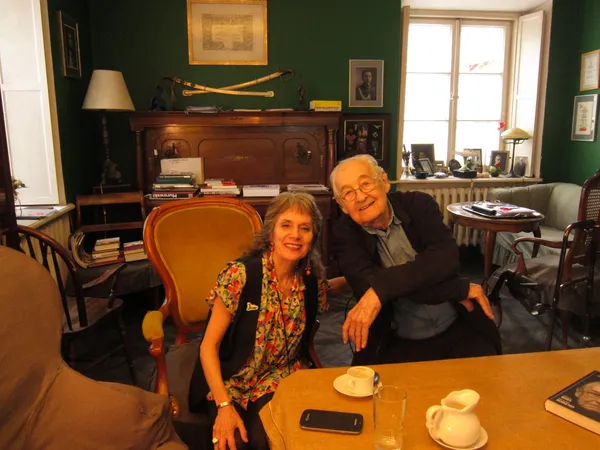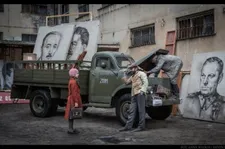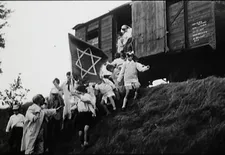 |
| Annette Insdorf with Andrzej Wajda at his home in July, 2014 Photo: Hanna Hartowicz |
Annette Insdorf, the author of Francois Truffaut; Indelible Shadows: Film and Holocaust, Philip Kaufman; and Double Lives, Second Chances: The Cinema of Krzysztof Kieslowski recalls meeting Andrzej Wajda for the first time in 1974 when he was directing Elzbieta Czyzewska (star of Wajda's Everything For Sale) in Albert Camus’s adaptation of the Dostoyevsky novel The Possessed at the Yale Repertory Theater with Meryl Streep and playwright Christopher Durang among the cast.
 |
| Andrzej Wajda's Afterimage is Poland's Oscar submission for Best Foreign Language Film |
Annette, is also a Professor in the Graduate Film Program of Columbia’s School of the Arts and moderator of the Telluride Film Festival where Wajda was honored in 1983. She shares with us her personal encounters with this great artist who left his indelible mark on the world.
"Maybe it's because I grew up speaking Polish that Andrzej Wajda's films have played such an important part in my life. My parents - Holocaust survivors from Poland - took me to see one of his films when I was still quite young. (It might have been Ashes And Diamonds at the Museum of Modern Art.) It was thrilling to hear the language of my mother and father being spoken by characters in a serious film. I continued to watch Wajda's motion pictures throughout my college and grad school years, and met him for the first time at Yale University around 1974: he was directing The Possessed at the Yale Rep, starring the brilliant Elzbieta Czyzewska (as well as an unknown Yale Drama School student named Meryl Streep). I told him I wanted to teach his work some day. He replied that I should teach American film instead: 'I learned from John Ford and Orson Welles,' he said.
 |
| Andrzej Wajda's Man Of Iron, winner of the 1981 Cannes Film Festival Golden Palm |
"In 1983, we met again, this time in the mountains of Colorado. As the Moderator of the Telluride Film Festival - which was honoring Wajda with a tribute - I became his translator as well, interpreting his always precise and evocative Polish into English. In the appreciation that I wrote for the Telluride tribute, I praised how his films have questioned system and psyche, communicating vital new images to both his countrymen and Western audiences. By the time his Man Of Iron won the Golden Palm at the 1981 Cannes Film Festival, Wajda was recognised as one of the most visually, politically and morally vigorous filmmakers in the world.
"When I went to Poland for the first time in 1989 - with my mother, for whom it was the first return since the end of World War II - Wajda and his wife Krystyna were very kind to both of us, including arranging for us to see his production of The Dybbuk onstage. With Solidarity shaping the upcoming elections, it was an exciting moment in Polish life, and I interviewed Wajda about it for The New York Times. We continued to see each other at festivals - for example, when his masterpiece Korczak premiered at the Cannes Film Festival - and whenever he visited New York. I brought him to Columbia University on two occasions, the second for a memorable and lengthy Master Class a few years ago.
 |
| "We continued to see each other at festivals--for example, when his masterpiece Korczak premiered at the Cannes" |
"I last saw him in 2014, visiting his lovely Warsaw home with our mutual friend Hanna Hartowicz. We talked not only about his own work, but that of Wojciech Has, whose films were the subject of the book I was writing. By this point in time, Wajda had made dozens of impressive films, staged innumerable theater pieces, and played a significant political role in Poland after the fall of Communism. Although we mourn Wajda's passing, his was a life fully lived." - Annette Insdorf
Read Volker Schlöndorff and Richard Peña's remembrances of Andrzej Wajda.





















